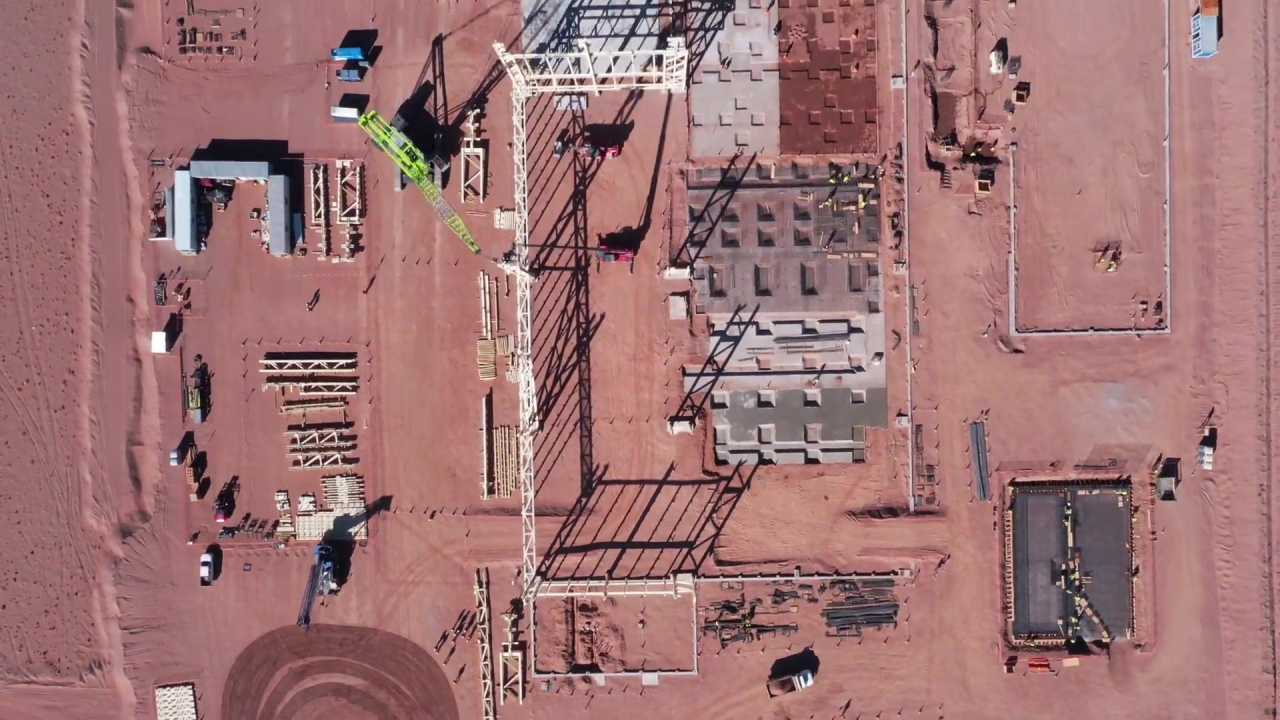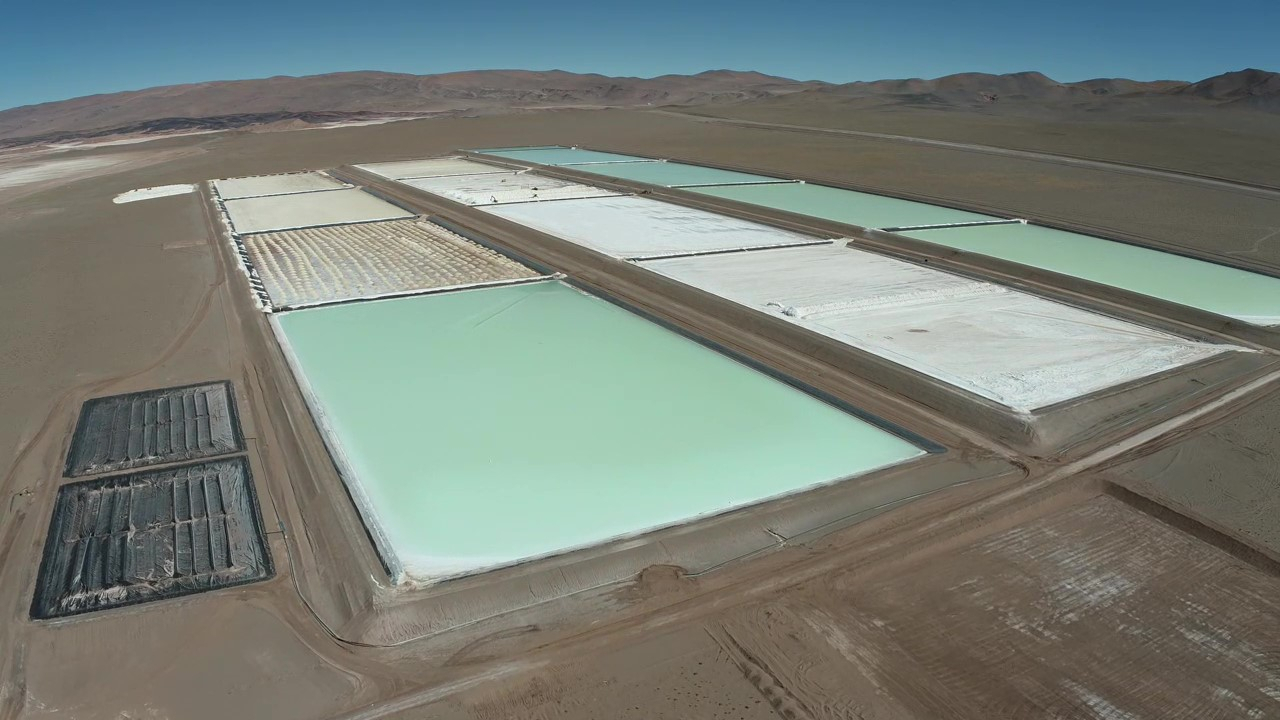[From the scene] Posco bets big on Argentina saltwater to top battery materials market
By Kim Da-solPublished : Dec. 20, 2022 - 16:35

SALTA, Argentina -- When Posco purchased a 17,500-hectare salt lake in the Argentinian highlands of Salta four years ago, little did they know they would strike gold -- or something even better.
Last year, a survey conducted by US consulting firm Montgomery & Associates found that the lake contains 13.5 million metric tons of lithium reserves, more than six times Posco’s initial estimate of 2.2 million tons in 2018.
The Mars-like landscape, 4,000 meters above sea level and some 1,500 kilometers from Argentina’s capital Buenos Aires, is set to become the heart of Posco’s push in secondary battery materials amid a lithium rush to power electric cars.
When The Korea Herald visited the site by Hombre Muerto lake on Dec. 12, construction beams were being lifted for the establishment of Posco’s first lithium commercialization facility. With annual production capacity of 25,000 tons of lithium hydroxide, the facility could output enough for 600,000 EV batteries. The lithium hydroxide will be supplied to local cathode manufacturers including Posco Chemical.
“What looks like land, in fact, is the lake,” said Oh Jae-hoon, the Posco vice president leading the project.
The company, which acquired mining rights for the Hombre Muerto salt lake from Australia-based Galaxy Resources for $280 million in 2018, has secured mineral rights to drill the neighboring land -- 25,500 hectares, or 30 times the size of Yeouido -- to extract saltwater from beneath the soil.
There, Posco will create three rectangular, artificial 60-hectare streams that will slowly dry up so lithium can be extracted.
“Each stream comprises three different sections called a pond. Each pond, 5 hectares in size, will naturally increase the concentration of lithium in water through natural evaporation under sunlight. The final pond will have about 4 grams of lithium for every 1 liter of saltwater dried out,” said Oh.

These ponds will help Posco relieve a lot of the burden from the costly and time-consuming process of extracting lithium from scratch, Oh explained. It takes about three to four months to dry up 75 percent of the saltwater in each artificial pond.
The water will then be transported to Posco’s commercialization plant where byproducts like magnesium and calcium will be extracted to create the final product: lithium phosphate.
“We’re processing it into lithium phosphate because it is the most transportable form of lithium,” said Oh, adding that once production facilities are built in 2024, it would take another six months to receive approval from clients to really kick-start the lithium business.
This comes as global demand for EV battery materials has surged amid a restrictive market situation under the US’ Inflation Reduction Act.
The company’s board has recently approved an additional $1.09 billion investment plan to build a secondary plant with an additional capacity of 25,000 tons of lithium. After construction is completed in the first half of 2025, two other plants will be built in the nearby area to ultimately produce 100,000 tons of lithium annually.
The plans are part of Posco’s goal to become one of the top three lithium producers by 2030. Along with lithium extracted from recycling batteries and ore mining, it has targeted annual capacity of 300,000 tons of lithium.
“Our new business in extracting lithium from the salt lake in northern Argentina has been thoroughly tested by building a demo commercial plant in 2019. We have tested commercial product viability by drying up the saltwater and extracting lithium for the past few years.
“Our exclusive technique using bipolar electrodialysis will turn lithium into a powdery form,” said Oh.
The demo plant will later be used as an education center for some 300 local staffers that Posco plans to recruit.
“We will eventually run our lithium plants in Salta as an Argentine company,” said Oh.
By Kim Da-sol, Korea Herald correspondent (ddd@heraldcorp.com)






![[From the Scene] Monks, Buddhists hail return of remains of Buddhas](http://res.heraldm.com/phpwas/restmb_idxmake.php?idx=644&simg=/content/image/2024/04/19/20240419050617_0.jpg&u=20240419175937)








![[From the Scene] Monks, Buddhists hail return of remains of Buddhas](http://res.heraldm.com/phpwas/restmb_idxmake.php?idx=652&simg=/content/image/2024/04/19/20240419050617_0.jpg&u=20240419175937)

![[KH Explains] Hyundai's full hybrid edge to pay off amid slow transition to pure EVs](http://res.heraldm.com/phpwas/restmb_idxmake.php?idx=652&simg=/content/image/2024/04/18/20240418050645_0.jpg&u=20240419100350)

![[Today’s K-pop] Illit drops debut single remix](http://res.heraldm.com/phpwas/restmb_idxmake.php?idx=642&simg=/content/image/2024/04/19/20240419050612_0.jpg&u=)